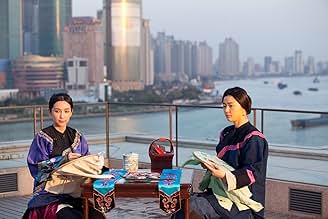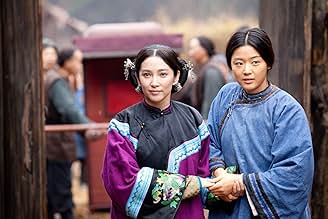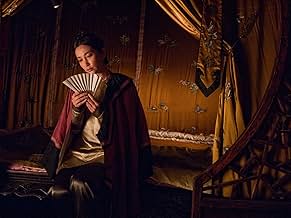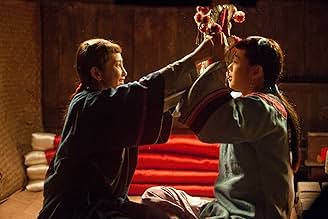IMDb RATING
6.1/10
4.1K
YOUR RATING
A story set in nineteenth-century China and focusing on the life-long friendship between two girls who develop their own secret code as a way to contend with the rigid social norms imposed o... Read allA story set in nineteenth-century China and focusing on the life-long friendship between two girls who develop their own secret code as a way to contend with the rigid social norms imposed on women.A story set in nineteenth-century China and focusing on the life-long friendship between two girls who develop their own secret code as a way to contend with the rigid social norms imposed on women.
- Awards
- 3 wins & 1 nomination total
Jun Ji-hyun
- Snow Flower
- (as Gianna Jun)
- …
Hu Qing Yun
- Mrs. Liao
- (as Jingyun Hu)
Shiping Cao
- Mr. Wei
- (as Shi Ping Cao)
Featured reviews
While no match for some of Wayne Wang's other movies, I'd call "Snow Flower and the Secret Fan" worth seeing nonetheless. It tells the story of two friends in present-day Shanghai, and the connection that they have with two girls in 19th century China through a fan on which they wrote secret messages.
Wang famously focused on Chinese-American families in "The Joy Luck Club", and took a bittersweet look at people's lives in "Smoke". This movie doesn't equal either of those, but I still recommend it. The development of Shanghai certainly reflects the changes in the lives of the girls (and the changes that China has undergone over the past 100 years). Not great, but worth seeing.
Wang famously focused on Chinese-American families in "The Joy Luck Club", and took a bittersweet look at people's lives in "Smoke". This movie doesn't equal either of those, but I still recommend it. The development of Shanghai certainly reflects the changes in the lives of the girls (and the changes that China has undergone over the past 100 years). Not great, but worth seeing.
SNOW FLOWER AND THE SECRET FAN is the cinematic adaptation of Lisa See's popular novel by writers Angela Workman, Ron Bass and Michael K. Ray and director Wayne Wang. The film unveils parallel stories between 19th century China and present day Shanghai - the tales of two women joined by laotong - a binding vow and contract to be eternal friends and share each others lives - communicating with a secret women's language called nu shu, carefully inked characters placed on the folds between the spines of a silken fan. By using the same actresses to play the parts of the girls two centuries apart adds a mysterious beauty to the films alluring flavor.
In 1826 Lily and Snow Flower become laotung and though they are from opposite ends of the social stratum they become devoted friends, undergoing the ritual of having their feet broken and bound to remain very small as adults - apparently a desired attribute for physical attraction as a potential bride. The poor girl is chosen for marriage by a wealthy family and the rich girl is promised to a butcher, an extreme reversal of roles in society and it is the manner in which each adapts and aids the other that demonstrates the depth of the bond of laotong. Concurrently in the film we meet Nina and Sophie in contemporary Shanghai: Nina has gained education and stature and is due to move to New York as part of an important business. Sophie is in an accident and only slowly do we realize that Sophie had the promise of moving to Australia to marry an Aussie singer (Hugh Jackman), more because she is pregnant than for love. Because of the laotung between Nina and Sophie the two make sacrifices that overcome all else to prove their loyalty. There are many parallels in the two stories that show a bond between the two sets of girls and to capture this bond securely the two girls form centuries apart are played by the same actresses: Lily/Nina become the roles of Bing Bing Li and Snow Flower/Sophie are portrayed by Gianna Jun. The supporting cast is carefully chosen and uniformly fine.
The sets and costumes and music enhance this film significantly. It is not a great epic of a movie, but it has a tender and touching story that is very well told by everyone involved.
Grady Harp
In 1826 Lily and Snow Flower become laotung and though they are from opposite ends of the social stratum they become devoted friends, undergoing the ritual of having their feet broken and bound to remain very small as adults - apparently a desired attribute for physical attraction as a potential bride. The poor girl is chosen for marriage by a wealthy family and the rich girl is promised to a butcher, an extreme reversal of roles in society and it is the manner in which each adapts and aids the other that demonstrates the depth of the bond of laotong. Concurrently in the film we meet Nina and Sophie in contemporary Shanghai: Nina has gained education and stature and is due to move to New York as part of an important business. Sophie is in an accident and only slowly do we realize that Sophie had the promise of moving to Australia to marry an Aussie singer (Hugh Jackman), more because she is pregnant than for love. Because of the laotung between Nina and Sophie the two make sacrifices that overcome all else to prove their loyalty. There are many parallels in the two stories that show a bond between the two sets of girls and to capture this bond securely the two girls form centuries apart are played by the same actresses: Lily/Nina become the roles of Bing Bing Li and Snow Flower/Sophie are portrayed by Gianna Jun. The supporting cast is carefully chosen and uniformly fine.
The sets and costumes and music enhance this film significantly. It is not a great epic of a movie, but it has a tender and touching story that is very well told by everyone involved.
Grady Harp
One of the key discoveries in my life is that for me and for many of my women friends, our friendship is often the most wonderful gift of life. This movie celebrates friendship among women. It relates two stories of women in China whose friendship is signed as a contract, a laotong. Laotong, the movie explains, is a life-long relationship between women, often considered more important than marriage. The movie presents two young friends in Shanghai in the 21st century who celebrate a laotong. Their friendship is portrayed with the closeness, empathy and support that is well known about friendship among women. And it also presents the difficulties and distances that are very real and perhaps unavoidable in close relationships. In a similar way, the movie presents two 19th century women who had had a laotong in very different circumstances and for whom the friendship is also both a marvelous gift and a difficult relationship. Movies are often about relations between a man and a women but seldom about women friends. That is why this movie seems to be controversial. It is not always accepted that for women their women friends are their most rewarding relationships despite the complicated faces of any human partnership. Go see the movie. It shows a side of women's life that is amazingly real but poorly understood.
Not having seen "Snow Flower and the Secret Fan" before now in 2015 was a really big mistake on my account, because this movie is nothing short of spectacular. This is really a beautiful movie, and it is a definite must watch for anyone who enjoy cinema that offers something astounding.
The movie is really nicely set up as it skips back and forth between present day China and ancient China, as we follow two sisters in the heart throughout the ages. And director Wayne Wang captured some really beautiful moments of sisterhood, love, friendship and loyalty.
"Snow Flower and the Secret Fan" has a really good cast, and I must admit that I was more than pleasantly surprised to see talented Korean actresse Ji-hyun Jun starring in this movie, and she really carried the movie so well. And right up there beside her was Bingbing Li with her equally impressive performance. Put together Jun and Li really shined on the screen with amazing chemistry.
A movie is nothing with a proper soundtrack, and the music in "Snow Flower and the Secret Fan" was majestic and almost ethereal. The score for this movie was so well-composed and complimented the movie quite well.
The wardrobe, setting and scenery for "Snow Flower and the Secret Fan" was quite good, and there was a lot of nice details to be found in just about every scene.
This is a very emotional story that was quite nicely put on the screen by director Wayne Wang, and the movie does spur an interest to read Lisa See's novel to fully get every detail to this story that spans the ages.
"Snow Flower and the Secret Fan" is a beautiful movie that is well-worth watching and should be watched by anyone who enjoy the finer moments in cinema.
The movie is really nicely set up as it skips back and forth between present day China and ancient China, as we follow two sisters in the heart throughout the ages. And director Wayne Wang captured some really beautiful moments of sisterhood, love, friendship and loyalty.
"Snow Flower and the Secret Fan" has a really good cast, and I must admit that I was more than pleasantly surprised to see talented Korean actresse Ji-hyun Jun starring in this movie, and she really carried the movie so well. And right up there beside her was Bingbing Li with her equally impressive performance. Put together Jun and Li really shined on the screen with amazing chemistry.
A movie is nothing with a proper soundtrack, and the music in "Snow Flower and the Secret Fan" was majestic and almost ethereal. The score for this movie was so well-composed and complimented the movie quite well.
The wardrobe, setting and scenery for "Snow Flower and the Secret Fan" was quite good, and there was a lot of nice details to be found in just about every scene.
This is a very emotional story that was quite nicely put on the screen by director Wayne Wang, and the movie does spur an interest to read Lisa See's novel to fully get every detail to this story that spans the ages.
"Snow Flower and the Secret Fan" is a beautiful movie that is well-worth watching and should be watched by anyone who enjoy the finer moments in cinema.
A film about laotong, the bonding of two women for eternity as kindred sisters, is unusual to say the least and one that is beautifully retold in the manner of so many oriental stories must be a rarity. The reason it works so well is because it is shot at two layers, one in the present day, and the other at a time when women needed each other for support. In fact the retelling of the latter is the result of a book written by Sophia of the life of Snow Flower in the title. In each layer Sophia/Snow Flower is bonded to Nina/Lily. The acting by Gianna Jun (Sophia/Snow Flower) and Bingbing Li as Nina/Lily is extraordinary with sterling support from an excellent cast. The cinematography and soundtrack are also first rate.
In essence the story explores love in many guises via the relationship of the two present day characters and their mirrors of old, but it is only at the conclusion of the film that we are allowed to be inside the minds of the kindred sisters and their relationship. This is not a film that pivots upon romantic love since it delves very deep into the agendas the women have and for that reason alone it may not be a commercial success. That shouldn't detract from its beauty as a work of art but clearly it has had an effect on the film's popularity on IMDb. And that is a shame because it is well worth lasting all of its one hundred and four minutes including the beautiful wash drawings displayed with the final credits.
I don't know how this film manages less than six on the ratings for I feel a little mean in only giving it eight because of the material it explores. It is worthy of a visit to cinema, or even ownership of a DVD. Oriental cinema has made another worthy addition to its growing list of excellent stories turned into film.
In essence the story explores love in many guises via the relationship of the two present day characters and their mirrors of old, but it is only at the conclusion of the film that we are allowed to be inside the minds of the kindred sisters and their relationship. This is not a film that pivots upon romantic love since it delves very deep into the agendas the women have and for that reason alone it may not be a commercial success. That shouldn't detract from its beauty as a work of art but clearly it has had an effect on the film's popularity on IMDb. And that is a shame because it is well worth lasting all of its one hundred and four minutes including the beautiful wash drawings displayed with the final credits.
I don't know how this film manages less than six on the ratings for I feel a little mean in only giving it eight because of the material it explores. It is worthy of a visit to cinema, or even ownership of a DVD. Oriental cinema has made another worthy addition to its growing list of excellent stories turned into film.
Did you know
- TriviaRupert Murdoch personally asked Fox Searchlight to release this film in North America.
- GoofsThe last paragraphs of the unsent letter that Nina found in Sophias apartment, which can be seen when she closes the notebook, don't match Nina's voice-over.
- ConnectionsReferenced in Conan: A Tree with Dutch Elm Disease Grows in Brooklyn (2011)
- How long is Snow Flower and the Secret Fan?Powered by Alexa
Details
- Release date
- Countries of origin
- Official site
- Languages
- Also known as
- Tuyết Hoa Bí Phiến
- Filming locations
- Production company
- See more company credits at IMDbPro
Box office
- Budget
- $6,000,000 (estimated)
- Gross US & Canada
- $1,348,205
- Opening weekend US & Canada
- $134,005
- Jul 17, 2011
- Gross worldwide
- $11,348,205
- Runtime
- 1h 44m(104 min)
- Color
- Sound mix
- Aspect ratio
- 2.35 : 1
Contribute to this page
Suggest an edit or add missing content























